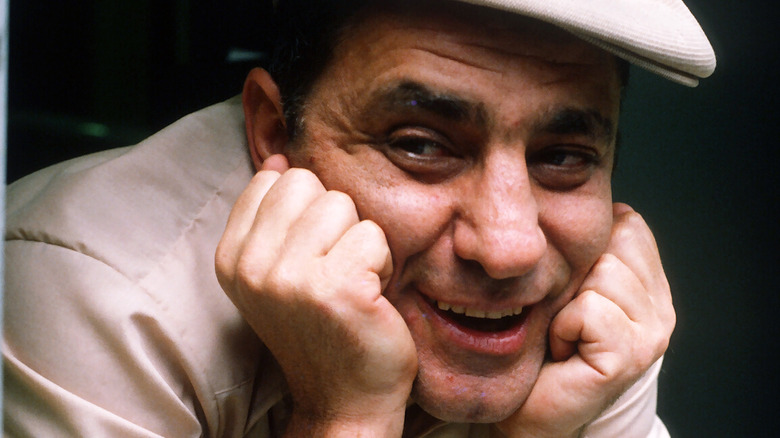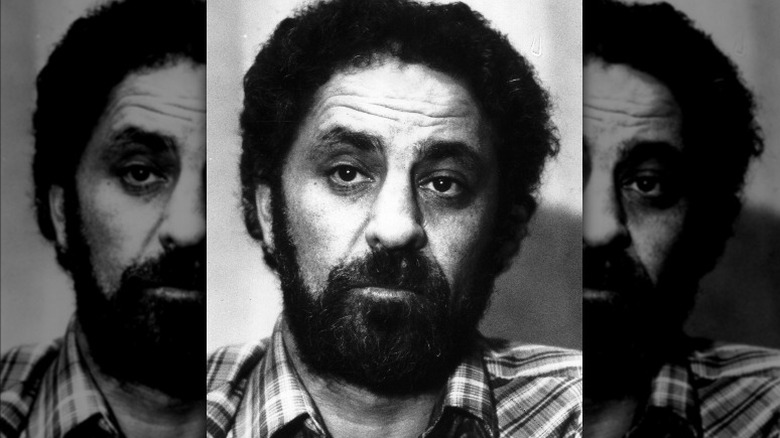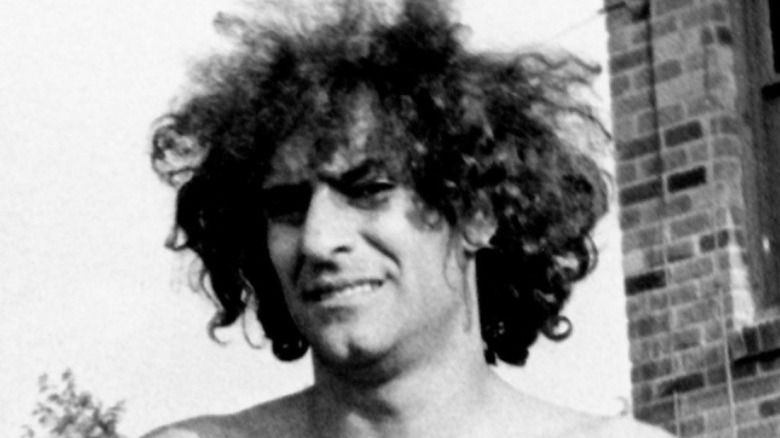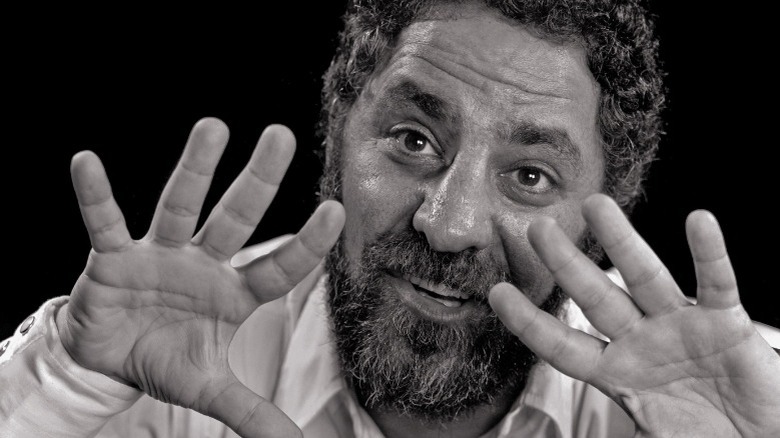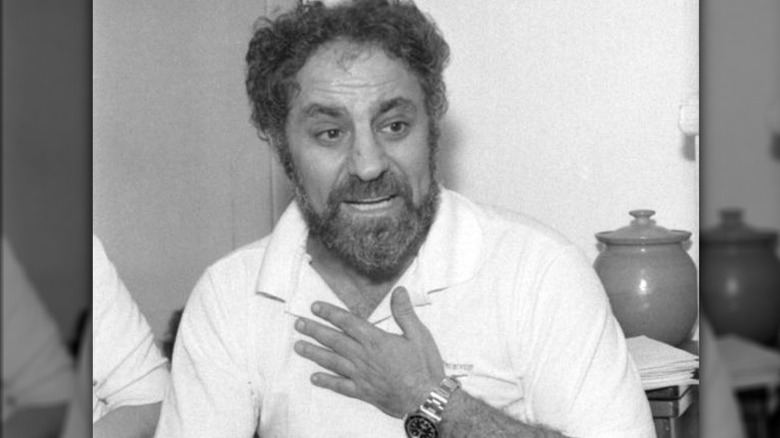The Tragic 1989 Death Of Counterculture Icon Abbie Hoffman
The counter-culture revolution that transformed the nation during the 1960s would never have had the momentum if it had not been for key figures that paved the way for needed social and policy changes that had protected systemic racism and sexism for generations. One pivotal character in this movement was a young Massachusetts native named Abbot Howard Hoffman. Better known to the world later as Abbie Hoffman, this social revolutionary worked tirelessly to bring about social justice in an era that was still living under the veiled racism from post-Jim Crow policy changes.
Though his work for social change could at times be overshadowed by his participation in disruptive antics that he would call "guerilla theater," it's well documented that Hoffman dove headfirst into two causes in the 1960s that he would soon become known for: Ending United States involvement in the Vietnam War and the fight for civil rights in the American South.
Soon after graduating from Brandeis University, Hoffman headed from the Northeast to Mississippi to organize voter drives. Wanting to help give disenfranchised African Americans a voice at the ballot box, he and other organizers worked to increase voter participation (via Encyclopedia).
Hoffman also worked with other anti-war activists to protest the country's involvement in southeast Asia, leading and organizing protests in major U.S. cities. Notably, Hoffman and seven other organizers were indicted on federal charges after clashes that occurred with protestors and police while demonstrating the 1968 Democratic Convention in Chicago (per Britannica).
When he died on April 12, 1989, the announcement of his passing marked the end of an era.
Hoffman struggled with bipolar disorder
The world may have moved on after the resignation of President Nixon and the end of the Vietnam War, but Hoffman continued to march forward, once remarking that "Democracy is not something you believe in or a place you hang your hat, but it's something you do. You participate. If you stop doing it, democracy crumbles..." (via Rolling Stone).
On the run for six years stemming from drug dealing charges in New York (via The New York Times), Hoffman surrendered and eventually was sent to prison in 1980. But even as a fugitive on the run, Hoffman was involved in high-level activism under the pseudonym Barry Freed (per Encyclopedia). "Freed" was commended for his environmental activism by the governor of New York and even testified to a Senate sub-committee on dangers facing the environment.
Whether he was Hoffman or Freed, the man who inspired two generations of activists was living a life plagued with mental health issues. Vanity Fair tells us that Hoffman was diagnosed with bipolar disorder in 1980. The outlet reports that it was speculated that as the cultural revolutionary wave from the 1960s waned and paved the way for former revolutionaries becoming Reaganites, Hoffman succumbed to deep bouts of depression. These manic-depressive cycles were noticed by close friends and family members to his death in 1989 (per The Morning Call).
Hoffman, who had made many headlines for over two decades would make for one final news story when it was announced that he died by suicide.
Hoffman took his own life in 1989
The Morning Call reports that Hoffman's body was discovered by his landlord. The coroner's inquest concluded that Hoffman's death was suicide, the result of Hoffman ingesting 150 30 milligram pills of phenobarbital. Bucks County Coroner Thomas Rosko also noted that there was a large amount of alcohol in Hoffman's system.
Prior to his death, Hoffman moved to a property in rural Bucks County, Pennsylvania, according to The Washington Times. The Morning Call tells us that Hoffman moved to a former turkey farm in 1982 shortly after his release from prison. He chose this location so that he could be on site to help combat the Point Pleasant water project; one he strongly opposed.
Despite his struggles, Hoffman was still active in social justice and environmental causes throughout the 1980s. Even though he took his work seriously, Hoffman was also known for his life of unpredictable antics and zany sense of fun. His antics during the 1960s involved nominating a pig to be the Democratic Party's presidential candidate and leading a group of Vietnam War protestors in an attempt to levitate the Pentagon in Washington, D.C. Several months before his death, Hoffman was visiting Christopher Cerf, his book editor. Cerf was recording a demo song for the popular "Sesame Street" character Oscar the Grouch called "Get Mad," and Hoffman joined in on the recording, singing with the chorus (per Rolling Stone).
If you or anyone you know is having suicidal thoughts, please call the National Suicide Prevention Lifeline by dialing 988 or by calling 1-800-273-TALK (8255).
Some speculated that his suicide was a reaction to his medication
Though Hoffman's struggles with mental health were well-documented, there was growing speculation that his death wasn't entirely his control. It was being circulated that Hoffman's death could be attributed to a pharmaceutical that he was prescribed. The Morning Call reports that Hoffman was taking the drug Prozac under the care of his physician. Prozac inventor Eli Lily & Company created the drug to help patients cope with a series of depressive disorders. The outlet reports that, though the drug was regarded as a "miracle of psychiatric medication," a Harvard University study revealed that taking Prozac would result in the desire to harm oneself in 3.5% of patients.
Was Hoffman among that statistic or was his suicide the result of medication that simply wasn't working in tandem with his brain chemistry? A family member of Hoffman's speculated that he wasn't using Prozac in the way it was prescribed to him. Per The Morning Call, Hoffman's sister-in-law Joan Hoffman stated, "I don't think he was taking it and taking it correctly at the end... I think he was only interested in taking things that would kill him."
If you or someone you know needs help with mental health, please contact the Crisis Text Line by texting HOME to 741741, call the National Alliance on Mental Illness helpline at 1-800-950-NAMI (6264), or visit the National Institute of Mental Health website.
A friend and former colleague of Hoffman claimed there was a conspiracy surrounding Hoffman's death
There was one person close to Hoffman which believed that his death wasn't a suicide at all. Rolling Stone reports that Hoffman's Chicago Seven co-defendant David Dellinger made statements supporting a conspiracy led by the CIA to murder Hoffman (per Rolling Stone). While this claim was 100% refuted by the evidence presented in the Bucks County Coroner's report, the theory that Hoffman had upset Central Intelligence Agency (CIA) officials does hold some water.
Several years before his suicide in 1989, Hoffman and Amy Carter (the daughter of former United States President Jimmy Carter) were involved in a protest at the University of Massachusetts Amherst when they were arrested by police. The Boston TV News reports that Hoffman and the 19-year-old Carter were among protestors jailed for demonstrating against the CIA, who were actively recruiting candidates on the college campus.
Prosecutors in the case against them felt strong enough to bring them up on charges. But the "necessity defense" that Hoffman and Carter's attorney Leonard Weinglass was able to convince the members of the jury that the crimes committed by his clients pale in comparison to those they were trying to prevent the CIA from committing. The defense put several former CIA operatives on the stand, who painted a picture to the jury of a government organization that caused the deaths of hundreds of thousands of Nicaraguans, Vietnamese, and Indonesian citizens (per Boston TV News).
Hoffman's legacy lives on, more than 30 years after his death
Hoffman died more than 30 years ago, but his legacy has continued to live on. His numerous books and published speeches are still available today, arguably helping to inspire a new generation of social activists.
In the years since his passing, Hoffman's activism has been the subject of a well-received biography by Marty Jezer, titled "American Rebel." In 2000, the Robert Greenwald film "Steal This Movie" was released, starring Vincent D'Onofrio, Janeane Garofalo, and Jeanne Tripplehorn. The film followed Hoffman's life and activism from the 1960s into his later life on the run from his felony warrant from New York (via IMDB). 2007 saw a half-animated/half-archival footage documentary about the infamous Chicago Seven Trial. Released as "Chicago 10," it starred Roy Schieder, Hank Azaria, and Nick Nolte (per IMDB).
In 2020, the critically acclaimed film, "The Trial of the Chicago Seven," was released, garnering six Academy Award nominations. The Aaron Sorkin-directed film with stars including Sacha Baron Cohen, Eddie Redmayne, and Jeremy Strong, and Frank Langella. Set during the 1970 trial of Hoffman and his accused co-conspirators that were arrested in the aftermath of the turmoil from the 1968 Democratic National Convention in Chicago, the film served as a reminder of the injustices that Hoffman fought against while educating a new generation of the sacrifices one makes when fighting a corrupt social system (per IMDB).
